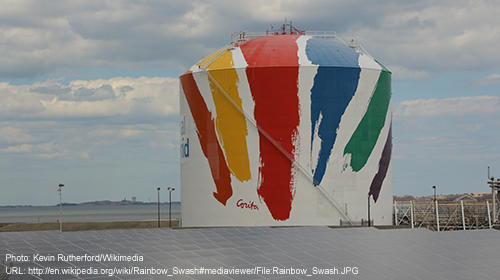An FBI Counterterrorism Agent Tracked Me Down Because I Took a Picture of This


This is a statement from one of the plaintiffs speaking at Thursday's press conference announcing the ACLU's lawsuit challenging the government's controversial Suspicious Activity Reporting program.
Good morning. My name is James Prigoff. I am 86 years old and a retired senior corporate executive, having been president of a Levi Strauss division and previously the senior vice president of the Sara Lee Corporation in Chicago. I am also a professional photographer – in fact, I have been a photographer for most of my life. My specialty is photographing murals, graffiti art, and other community public art. I am the co-author of three books utilizing my photographs, one of which, Spraycan Art, has sold over 200,000 copies. My photographs appear in countless other publications and my photography has been exhibited at the Smithsonian in Washington and in many other galleries. I have lectured on photography and public art in museums, universities, and venues worldwide.
I have never had an experience like I had when attempting to photograph the "Rainbow Swash" outside Boston in 2004. Let me explain.
The Rainbow Swash is an iconic piece of public art near Boston painted on the circumference of a 140-foot high liquefied natural gas storage tank in 1971 and repainted in 1992 at an adjacent site. It is actually one of the largest copyrighted pieces of art in the world. The original artist was Korita Kent.
I went to Dorchester, Mass., to photograph it, but before I could take a picture, I was confronted by two security guards who came through their gate and told me I could not because the tank was on private property. I pointed out that I, being well outside the fenced area, was not on private property – but they insisted I leave. If one goes to Wikipedia there are number of excellent close-up shots for the entire world to see.
A few months later, I found a business card on the front door of my home in Sacramento from Agent A. Ayaz of the Joint Terrorism Task Force, asking me to call him. One of my neighbors, an elderly woman, told me that two men wearing suits had come to her door to ask her about me, her neighbor.
When I called Agent Ayaz, he asked if I had been in Boston recently. At that moment I realized that the security guards at the Rainbow Swash site must have taken down the rental car license plate number and reported me to a law enforcement agency. I never gave the guards any information about myself, so I must have been traced across country via my rental car record.
So, consider this: A professional photographer taking a photo of a well-known Boston landmark is now considered to be engaged in suspicious terrorist activity?
I lived through the McCarthy era, so I know how false accusations, surveillance, and keeping files on innocent people can destroy their careers and lives. I am deeply troubled that the SAR program may be recreating that same climate of false accusation and fear today.
Photography is an important part of my life, and I plan to keep photographing public art and public places that contain WPA murals and other architectural sites – as I have been doing for 69 years. Why have my artistic pursuits landed me in a national database potentially linking me to "terrorist" activities? There is no reason for it. This program must be stopped.
Learn more about government surveillance and other civil liberties issues: Sign up for breaking news alerts, follow us on Twitter, and like us on Facebook.
Stay informed
Sign up to be the first to hear about how to take action.
By completing this form, I agree to receive occasional emails per the terms of the ACLU's privacy statement.
By completing this form, I agree to receive occasional emails per the terms of the ACLU's privacy statement.


